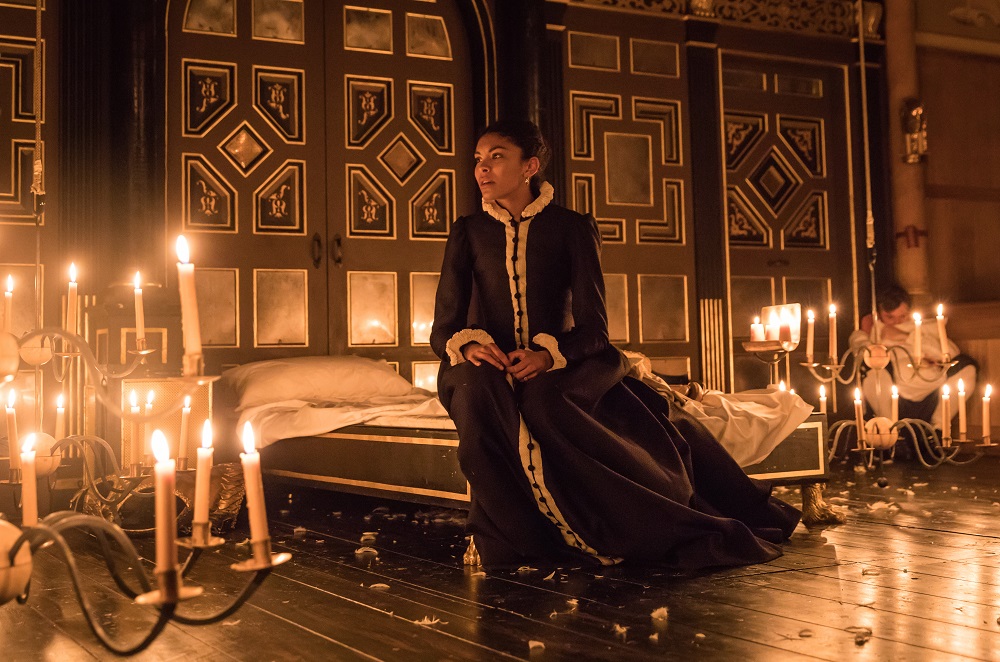There's no reason why ruffs and candles shouldn't mesh with bursts of contemporary speech, song and lighting, given a defter hand than director Ellen McDougall's. Shakespeare's timeless issues of racism and sexism have plenty of mileage in them, though in less skewed proportions than they find here. Many of this production's components are promising, but the whole is a strident mess.
None of this is the fault of the admirable Othello, Kurt Egyiawan. Noble and low-voiced in fine speech for the opening Venice act, he also makes us aware of a man on edge and alert to slights about his skin, which seem commonplace even though he's been made General. That partly prepares us for the turn to jealousy, but it's been a stretch for every other Othello I've seen, due to Shakespeare's compression of the way Iago's poison begins to work, and Egyiawan is no exception. He deals chillingly with deadly quiet and one frightening outburst in Othello's first questioning of Desdemona over the handkerchief, and he never rants.
Unfortunately he's diminished by two things in particular. One is the casting of Sam Spruell as an uninteresting Iago, no better than the other male actors in smaller roles. Spruell neither wins our semi-amused complicity during his early conspiratorial soliloquies, as a good Iago (and Richard III) absolutely must, nor shows us what a skilful dissembler Iago must be to convince those he’s drawing into his net. The so-called temptation scenes lose half their power as a result (and what happened to the surely indispensible lines beginning "Look where he comes...", when Iago observes Othello truly on the rack?) The other undermining is McDougall's in prioritising the ill-treatment of women at the expense of having us pity Othello's downfall. She has one good actor, Natalie Klamar, to give a plucky Desdemona – though the replacement for the Willow Song is an embarrassment and the interpolation of "Get...off...me" as the smothered lady's last words was a mistake – and another even finer, Thalissa Teixeira (pictured above), to thrust home the injustices suffered by Desdemona's maid and Iago's abused wife Emilia; her courageous if fatal speaking-out is underlined with blazing clarity.
The other undermining is McDougall's in prioritising the ill-treatment of women at the expense of having us pity Othello's downfall. She has one good actor, Natalie Klamar, to give a plucky Desdemona – though the replacement for the Willow Song is an embarrassment and the interpolation of "Get...off...me" as the smothered lady's last words was a mistake – and another even finer, Thalissa Teixeira (pictured above), to thrust home the injustices suffered by Desdemona's maid and Iago's abused wife Emilia; her courageous if fatal speaking-out is underlined with blazing clarity.
So far, so good. But there are two more women: Nadia Albina, far too ubiquitous as Bianca and the worst casualty of McDougall's sledgehammer-witted textual interpolations, and, as the object of her affections, "Michelle" Cassio, blandly played by Joanna Horton. The end gambit doesn’t justify what until then seems like a gimmick; the sex change adds nothing but occasional confusion (when you hear “she” you think Desdemona) until the payoff, which is to have the female soldier and the girl denounced as "whore", like Desdemona, as survivors testifying to the brutality of men. That exposes how McDougall’s priority isn’t really Othello at all; again, a subtler director could have got the best – or the cruellest and worst – of both worlds.
Here, for the last and most jarring time, Orlando Gough’s choral music – well sung, but a hindrance rather than the enhancement of his work on the Almeida Bakkhai, simply because it badly needs context – holds up the play in a clunking conclusion. Like the music, the bed is also omnipresent: it’s where Desdemona has all too visibly lost her virginity on her wedding night, and also where her and Emilia’s corpses are strewn at the end. Fine, but in between it’s an obstacle: another symbol, like the Cassio, of a director who has a good idea and then has to bend the drama out of shape to suit it. McDougall’s reign at The Gate Theatre had better come up with more cohesive productions than this.















Add comment